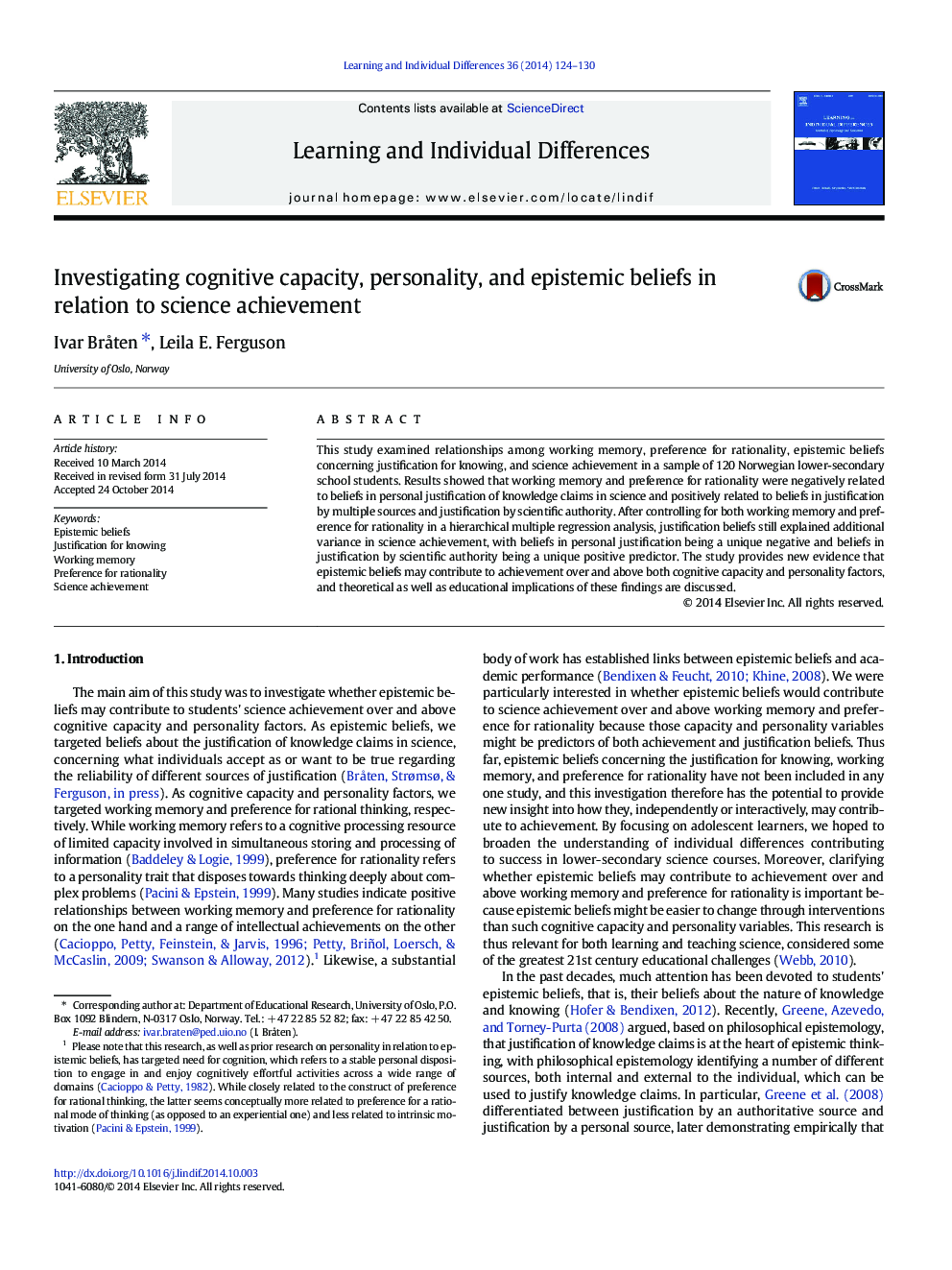| کد مقاله | کد نشریه | سال انتشار | مقاله انگلیسی | نسخه تمام متن |
|---|---|---|---|---|
| 6845011 | 621085 | 2014 | 7 صفحه PDF | دانلود رایگان |
عنوان انگلیسی مقاله ISI
Investigating cognitive capacity, personality, and epistemic beliefs in relation to science achievement
ترجمه فارسی عنوان
بررسی ظرفیت شناختی، شخصیت و باورهای معرفتی در ارتباط با دستاوردهای علمی
دانلود مقاله + سفارش ترجمه
دانلود مقاله ISI انگلیسی
رایگان برای ایرانیان
کلمات کلیدی
اعتقادات معرفتی، برای دانش دانستن پیش شرط، حافظه کاری، ترجیح عقلانیت، دستاوردهای علمی،
ترجمه چکیده
در این مطالعه روابط بین حافظه کاری، اولویت عقلانیت، اعتقادات معرفت شناختی در مورد توجیه دانستن و دستاوردهای علمی در نمونه 120 نفر از دانش آموزان دبیرستان نروژی مورد بررسی قرار گرفت. نتایج نشان داد که حافظه کاری و اولویت عقلانیت، با اعتقادات شخصی در مورد تقاضای دانش در علم و اعتقاد به توجیه منابع چندگانه و توجیه آن توسط مقام علمی، منفی است. پس از کنترل برای حافظه کاری و اولویت عقلانیت در تجزیه و تحلیل رگرسیون چندگانه سلسله مراتبی، اعتقادات توجیه همچنان واریانس اضافی در دستاورد علمی را توضیح دادند؛ اعتقادات در توجیه شخصی منفی و باورهای منحصر به فرد در توجیه توسط قدرت علمی است که یک پیش بینی مثبت منفی است. این مطالعه شواهد جدیدی را ارائه می دهد که اعتقادات معرفتی ممکن است در دستیابی به بالاتر از هر دو توانایی شناختی و عوامل شخصیت، نقش داشته باشد و پیامدهای نظری و آموزشی این یافته ها مورد بحث قرار گرفته است.
موضوعات مرتبط
علوم انسانی و اجتماعی
روانشناسی
روانشناسی رشد و آموزشی
چکیده انگلیسی
This study examined relationships among working memory, preference for rationality, epistemic beliefs concerning justification for knowing, and science achievement in a sample of 120 Norwegian lower-secondary school students. Results showed that working memory and preference for rationality were negatively related to beliefs in personal justification of knowledge claims in science and positively related to beliefs in justification by multiple sources and justification by scientific authority. After controlling for both working memory and preference for rationality in a hierarchical multiple regression analysis, justification beliefs still explained additional variance in science achievement, with beliefs in personal justification being a unique negative and beliefs in justification by scientific authority being a unique positive predictor. The study provides new evidence that epistemic beliefs may contribute to achievement over and above both cognitive capacity and personality factors, and theoretical as well as educational implications of these findings are discussed.
ناشر
Database: Elsevier - ScienceDirect (ساینس دایرکت)
Journal: Learning and Individual Differences - Volume 36, December 2014, Pages 124-130
Journal: Learning and Individual Differences - Volume 36, December 2014, Pages 124-130
نویسندگان
Ivar Bråten, Leila E. Ferguson,
